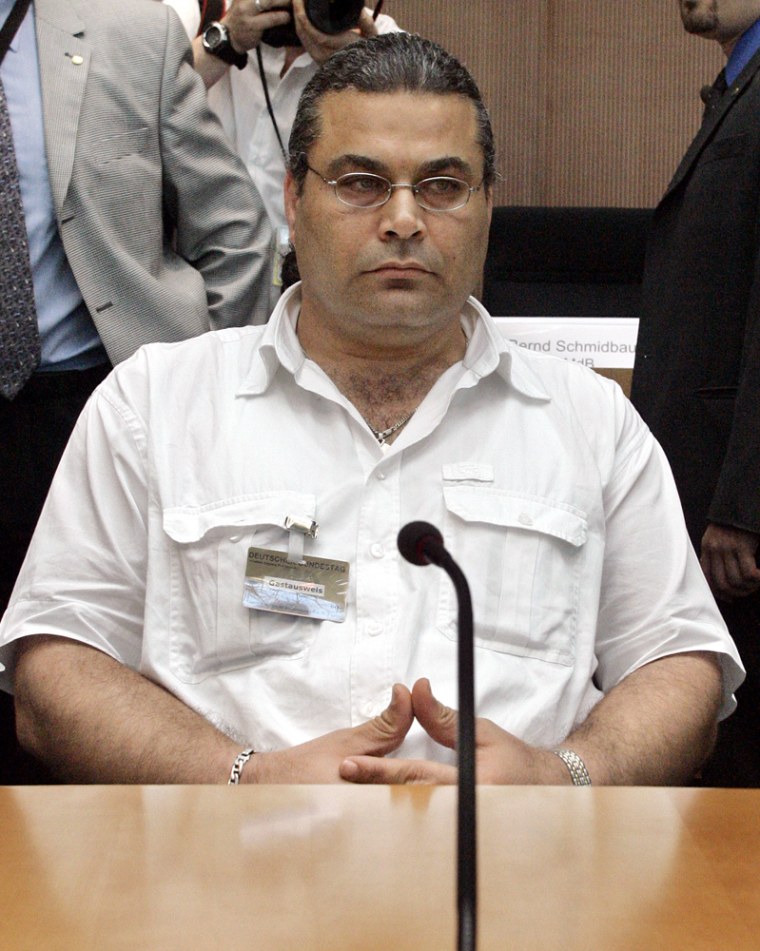A German citizen testified Monday in a Spanish court that he was kidnapped and tortured by U.S. intelligence agents in 2003, then flown by the CIA to Afghanistan where he was imprisoned and abused for five months.
Khaled al-Masri, 43, broke down in tears several times during his testimony before National Court Judge Ismael Moreno, who is investigating reports that the CIA used a Spanish airport to secretly transfer suspected terrorists to countries where they were tortured.
Earlier this year, the Kuwaiti-born al-Masri testified before German lawmakers and a European Parliament panel, but his lawyer, Ignasi Ribas, said “this time he has said it before a judge, and that is important.”
Al-Masri, a former car salesman and a father of five, said he was abducted on Dec. 31, 2003, at the Serbia-Macedonia border while on vacation. He said he was taken to a hotel in the Macedonian capital of Skopje where he was imprisoned and tortured for 23 days before being flown to Kabul, Afghanistan.
Al-Masri’s lawyer, Manfred Gnjidic, said documents show the plane, a Boeing 737, that took al-Masri from Macedonia to Afghanistan in January 2004 originally came from Algeria via Mallorca, a Spanish island in the Mediterranean.
Accused of training at al-Qaida camp
Al-Masri said his captors — whom he identified as North Americans and one German — accused him at one stage of having been at an al-Qaida training camp in Jalalabad, Afghanistan, and that he was wanted by German and Egyptian police.
Once he arrived in Afghanistan, he said he was put in a prison for five months and tortured. He said he was released in Albania in May 2004 after the CIA discovered they had the wrong person.
Al-Masri declined to take questions from reporters when the closed session ended.
“By telling his story in detail, he’s been living again the same torture he suffered years ago,” Gnjidic said.
The lawyer added that there are investigations under way to find out where exactly al-Masri was held in Kabul and to identify his captors.
The National Court began probing the alleged CIA flights out of Mallorca in June. If Moreno finds enough evidence to support the torture allegations, he could order a broader investigation seeking charges against those responsible.
Since 1998, Spain has embraced the so-called universal justice principle, which allows for the prosecution of crimes against humanity alleged to have been committed in other countries.
Al-Masri was the first witness in the case.
Reports of clandestine prisons and secret flights
A Swiss lawmaker investigating on behalf of the Council of Europe has named Spain as one of 14 European countries that allegedly colluded with the U.S. intelligence agency to transport suspected terrorists on secret flights.
Some of the detainees were allegedly held in secret prisons in Europe, according to the report, which did not offer any direct evidence to support the claims.
Spain firmly denies the government knew of any illegal activity by the CIA to transport terror suspects on flights via Spanish territory.
In November 2005, Spain said it had investigated flights by private planes, described in Spanish media reports as being operated for the CIA, to Palma de Mallorca and Tenerife in the Canary Islands, but had been assured by U.S. authorities that no laws had been broken.
Clandestine prisons and secret flights via or from Europe to countries where suspects could face torture would breach the continent’s human rights treaties, including the European Convention on Human Rights.
The Council of Europe has no power to punish countries for breaching the treaty other than terminating their membership in the organization. Based on irrefutable evidence, the European Union might be able to suspend the voting rights of a country found to have breached the convention.
